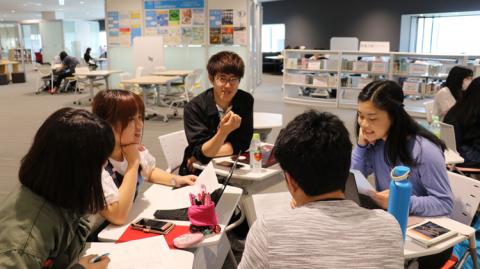Sponsored content: created in partnership with Kyushu University, part of the World 100 Reputation Network.
Futures are made at universities, and Kyushu University in Japan is taking an innovative approach to equipping students with the skills to make an impact on the global stage.
Kyushu University is one of Japan’s leading research-oriented higher education institutions. Home to about 19,000 students and 8,000 faculty and staff, Kyushu’s world-class research centres cover a wide range of study areas and research fields, from the humanities and arts to engineering and medical sciences. The School of Interdisciplinary Science and Innovation (ISI) is leading the way in ensuring that students gain the skills to help them make an impact once they leave the university.
Based on the concept of “kyoso” – which translates to “co-creative” – Kyushu launched the ISI in April 2018 to nurture the next generations of global leaders. The idea is to collaborate with people from diverse backgrounds and to generate innovation by going beyond traditional values and academic boundaries.
The acquisition of kyoso relies on creative task-framing, teamwork and intercultural communication skills. It is for this reason that Kyushu’s students are required to study overseas as part of their curriculum. The university offers a range of destinations with its partner institutions.
The learning at Kyushu’s ISI is focused on solving problems. All students, whether they major in the humanities or a science, are required to gain basic academic fitness by the time they graduate from high school.
At the ISI, students first identify the problem they want to address and then acquire the expertise required to solve it. Rather than, “I learned this, so I’ll do that”, the approach is “I want to do this, so I’ll learn that”.
By actively learning while remaining aware of the problem at hand, students are supported to develop the attitudes, focus, knowledge and skills required to flourish in society.
“In our school, we do not focus on specialised training,” says associate professor Jan Brezina. “We want our students to have broad minds that can tackle difficult and complex programmes. For example, if you want to deal with global warming or excessive garbage, you cannot simply look at it from the point of view of an ecologist or an engineer or a politician. You really need someone who’s going to take all the different views together and create a real solution for a real problem.”
“For the kyoso project, I’m pretty interested in how people think, and I think it came from facing that wall that I came across when I first got here,” says ISI student Erena Sabrina Yoshida. “I’m very interested in knowing how different people think and why they think that way. For example, you could give the same picture to someone, and they could see two completely different images and [you can consider] why they register that way or why they feel certain emotions towards it.”
“I’m interested in public health as an interdisciplinary study,” says ISI student Hiroaki Onizuka. “I decided to choose economics as my major as well as data science and health economics as a minor. In ISI, I deepen my understanding of public health problems.”
In a recent interview, Johan Lauwereyns, a professor at the university, discussed which type of students would be best suited to Kyushu. “Our school is ideal for students who have wide-ranging interests, an open mind and a willingness to try new things. It is also the best place for students who have a unique vision that goes beyond the usual boundaries of academic disciplines,” he said.
“Roughly speaking, I see three routes for our students after graduating,” Lauwereyns added. “The first is to become a researcher in an innovative, interdisciplinary research field. The second, to become an innovative policymaker in business or government, either local or global. The third would be to start your own venture or independent enterprise as a social innovator.”
The World 100 Reputation Network is a network of leading universities across the world.
about the unique education offering at Kyushu University and the School of Interdisciplinary Science and Innovation.

Comments